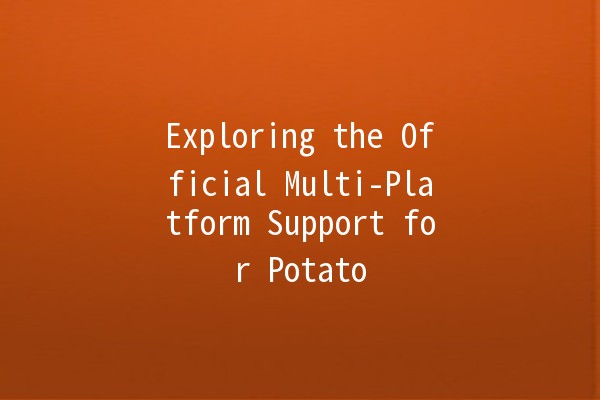In today’s rapidly evolving digital landscape, the ability to leverage various platforms for application development and user engagement is crucial. Potato, as an innovative software initiative, has made significant strides in ensuring its compatibility across a range of operating systems and devices. In this article, we will explore the official multiplatform support status of Potato, highlighting its features, benefits, and how users can maximize productivity through practical tips.
Overview of Potato's MultiPlatform Support
Potato is designed with versatility in mind, allowing users to access its features seamlessly across multiple platforms. The software supports Windows, macOS, Linux, Android, and iOS, thereby catering to a diverse user base. This crossplatform capability is essential for fostering user engagement and enhancing productivity.
Key Benefits of MultiPlatform Support:
Accessibility: Users can access Potato on their preferred devices, ensuring that they can work from anywhere.
Consistency: The user experience remains uniform regardless of the device, which minimizes the learning curve.
Integration: Potato can easily integrate with different apps and tools, enhancing workflow efficiency.

s into Supported Platforms
Windows
For Windows users, Potato offers a robust application that utilizes Windows native features for optimal performance. This includes seamless integration with Microsoft Office Suite and Windows File Explorer.
Example Use Case: A product manager can use Potato on their Windows laptop to manage projects, analyze data, and generate reports—all in realtime collaboration with team members.
macOS
On macOS, Potato is optimized for high performance, taking advantage of the aesthetic design and userfriendly functionalities that macOS provides. Features like the Touch Bar are supported for enhanced user interaction.
Example Use Case: Designers can leverage Potato on macOS to create visually stunning presentations that synchronize with their iPads for seamless transition.
Linux
Potato provides a versatile version for Linux users, promoting opensource collaboration and customization. It supports various Linux distributions, ensuring flexibility for developers and system administrators.
Example Use Case: A developer can use Potato on a Linux server to manage database systems and deploy applications without any compatibility issues.
Android & iOS
For mobile users, Potato delivers a fully responsive application for both Android and iOS devices, enabling users to manage tasks efficiently on the go.
Example Use Case: A salesperson can access customer data and project updates through Potato’s mobile app during meetings, enabling rapid decisionmaking and responses.
Tips for Maximizing Productivity with Potato
While Potato's multiplatform support opens many doors, the following productivity enhancement techniques can significantly improve user experience and efficiency.
Learn and implement keyboard shortcuts specific to each platform. Keyboard shortcuts enable you to perform actions quickly without navigating through multiple menus.
Practical Example: On Windows, use `Ctrl + N` to create a new project quickly, and on macOS, use `Cmd + B` to format text. Familiarizing yourself with these shortcuts can save time in daily operations.
Utilize automation features within Potato to schedule recurring tasks, reduce manual effort, and focus on highpriority projects.
Practical Example: A marketing team can create an automated report that compiles analytics from various campaigns weekly, ensuring stakeholders receive updates without manual intervention.
Make full use of Potato's collaborative features that allow realtime editing and commenting, enhancing team productivity.
Practical Example: Allow team members to contribute to a project document simultaneously, facilitating brainstorming sessions and reducing the time needed for feedback rounds.
Take advantage of integrations with other applications that you regularly use, such as calendars, task managers, and CRMs.
Practical Example: Link Potato with your Google Calendar to schedule meetings directly from the app, ensuring that deadlines and appointments are always top of mind.
Keep your Potato application updated across all devices to benefit from the latest features and security enhancements.
Practical Example: By ensuring each platform runs the latest version, users can take advantage of new functionalities, such as better cloud storage options, directly impacting productivity.
Addressing Common Inquiries about Potato's MultiPlatform Support
Potato supports a variety of platforms, including Windows, macOS, Linux, Android, and iOS—allowing users to utilize the application across different systems seamlessly.
Yes, Potato offers a mobile application for both Android and iOS, ensuring that users can access their projects and collaborate with their teams on the go.
Potato automatically syncs user data across all platforms when connected to the internet. Users can also manually sync data through the application settings.
While Potato aims to provide a comprehensive set of features for Linux users, some advanced functionalities available on Windows and macOS might have limited support depending on the distribution.
Absolutely! Potato is designed to facilitate crossplatform collaboration, allowing users from any supported system to work together seamlessly in real time.
Potato releases significant updates quarterly, with minor updates rolled out periodically as needed. Users are encouraged to enable automatic updates for the best experience.
In summary, Potato's commitment to multiplatform support not only enhances accessibility and productivity for users but also reflects its adaptability in a diverse digital environment. By leveraging the techniques mentioned above, users can optimize their experience with Potato, ultimately driving their success across various projects and collaborations.